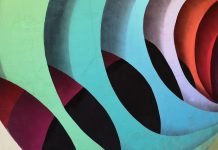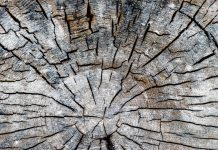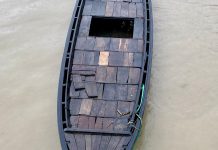White skyscrapers rose behind one end of a two-kilometre-long, curving bay; at the bay’s other end, cliff-top, sandstone mosques, shops and minarets overlooked the sea.
The skyscrapers glittered at night while darkness covered the sandstone.
Palestinians once exported oranges from the sandstone port. Their fishermen once prayed in the mosques before going out to sea. Dave’s Star now wafts in the port, orange juice now drunk by rich American Jews in the café facing the boats, the orchards confiscated by the skyscrapers’ constructors.
The café’s customers could watch blue stars on white fabric wafting on white masts above the port’s white-hulled boats, reflections dancing on the hulls, all else still.
The blue canvas covering the boats was strung to blue poles that were strung by white ropes to white masts. Some decks were blue and white, the reflections on the boats’ hulls snow-white when hit by sunlight.
Excluding flags and reflections, all was static in that blue-and-white wonderland of dreamy construction.
On the dock, sandstone blocks, like ruins, indicated that something else had once been there. Black-and-white photographs along the harbour revealed part of that past; but connections elude dreamers.
Two American women, wearing long, white dresses and heavy make-up, and glittering with jewellery, were in the café’s terrace. Their blonde hair reached hips that spilled over their chairs. Their jewellery, like the night-time skyscrapers, suggested they had tapped gold mines, their blue eyes rimmed by mascara. Gold dotted their fingers.
“She lives near the central bus station,” one said.
“Really?” the other replied.
Illegal immigrants at the Central Bus Station said horrible things like: “You thieving bastards stole this country from Arabs.”
“Even Africans are anti-Semitic,” the first one said, before adding: “She’s looking for a place around here. Especially now that this area’s improved so much.”
“Improvement” meant that the real owners couldn’t re-buy the properties stolen from them, the prices now exorbitant. Ownership rights before 1953 had been eliminated, the poor, evicted owners replaced by people whose ascendants half-wrecked the place in the nineteen forties.
A lone man, facing the boats, was sitting beside the Americans. He hadn’t looked up from his book in the half hour I had been in the terrace. The café’s tranquillity aided reading and observation; ports have natural tranquillity; because of such peacefulness, the Muslim fishermen of past times couldn’t have imagined that their descendants would be murdered or become refugees.
The reader also hadn’t imagined that his peace would get disturbed. The Americans’ swatting voices walloped the quietude. A bird flew from a rope in the harbour after one of the women guffawed like a crow, the reader’s peace further disturbed when the women moved their table closer to his to avoid encroaching sunlight, their voices’ volumes not reduced by proximity to the reader, who, perplexed, glanced behind, grimacing at this space invasion. The reader constantly looked around, his face suggesting: “Don’t they know someone is already here?”
Apparently not. The women’s table was now almost touching the reader’s chair, his blue eyes bemused as he wondered why he was being invaded by women whose insensitivity to the laws of space ownership included high-pitched giggling and comments like “Kneeoohhh?” and “Really?” blasted into his ears.
The ropes attaching blue poles to the white masts created strong, but tentative, associations of misleading solidity. Hurricanes would have caused untold damage in that harbour.
The women’s obliviousness to their destruction of tranquillity caused the reader’s eyes to become piercing, like those of a “terrorist.”
“It’s more difficult wearing my rings in summer,” one of the women said, “because heat makes my fingers swell.”
The man was reading Hamlet, his murderous eyes suggesting that something rotten now existed in the state of Israel.
“Tis the blazing ball of compressed helium that magnifieth the mighty metatarsal of glamorous display,” I thought, seeing Shakespeare on the book’s cover.
“That’s a pity,” the other woman replied, “given that you’re about to get married.”
She who marries in her Spiritual Home must defeat the Magnified Metatarsal of Obstruction. The Torah, page ninety-two, Moses Goldmine Editions, New York, 2016.
The reader, looking around again, felt as if something was creeping up behind him. His blonde hair looked striking against his black-framed glasses and his black T-shirt, black like Hamas.
Maybe, I thought, he now understands how Hamas feels?
A waitress arrived with the women’s order. A speck of oil-soaked cucumber struck one of their dresses, like a low-technology missile that had freakishly hit a valuable target. The dress-owner’s head flew back in shock, her gasp`s shock wave expanding over the terrace. She dabbed the affected zone with a water-soaked serviette, appalled by such “horrific” damage.
The other woman said: “Someone once showed me how to remove stains. You put lemon juice in boiling water and put it on the stain, and, like, it makes things sparkle!”
The stain-removal expert was oblivious of the irony of her sparkling smile. Maybe their bedrooms were pink, glittering things in their homes leaving sparkles on their perfect, white teeth?
“How’s the wedding-dress hunt going?” the stain-removal expert asked.
“It’s hard making a decision,” the other one said.
Options can be trying, especially when you can live in countries your family wasn’t born in.
“But,” the engaged one added, “I want bare shoulders, summer, of course, and a chest with jewels.”
“If you need help deciding,” the other said, “let me know.”
“Oh, thanks,” the engaged one replied. “It’s better getting second opinions. Have you got plans for this afternoon?”
“No, I’m free. Let’s have a look around.”
After “eating” (they left loads of food) they started smoking, the reader’s displeasure not affecting the discussion unfolding behind him about wedding dresses, the Big Day and who to invite. The reader’s painstaking amazement couldn’t halt smoky loudness, powerless to stop tranquillity’s bulldozing.
Although the women’s unconsciousness was apparent, I didn’t ascribe it to insensitivity. They were probably sensitive about some things; but a belief in their importance restricted their ability to see beyond their world in a way that would have empowered those around them; hence they unconsciously shattered peace.
On leaving, they left behind an almost untouched Greek salad. Half-eaten slices of bread sat beside their salad bowls, bread crumbs dotting the tray the bowls were sitting on. Crumbled serviettes covered the table amid cigarette ash.
An elderly couple approached the table the Americans had vacated. Their sour eyes stared at the mess, like witnessing violent anomalies amid pleasantry.
“What a waste,” the man said, picking up the tray that he intended to take into the café.
Perhaps because of shock, he didn’t handle the tray well. He dropped it, the Greek salad bowl turning over, cucumber shooting across the table.
The couple left the mess behind and sat where paltry shade was coming from a white umbrella. They had wanted to sit where the shade produced by the café’s facade was intense. They were also displeased by the second table’s condition: empty cups sat on coffee-stained saucers beside dishes covered by cake crumbs.
A waitress came to take their orders. The seated woman said: “This place is a mess. You’re supposed to clean up after people.”
The woman pointed at the cucumber her husband had spilled across the table where the Americans had been sitting. The woman’s hands waved around righteously as she added: “These tables are health hazards.”
The waitress’s irises sharpened into what resembled hard mica. Her hands rushed around as she said: “And why do people leave such messes behind? Are we supposed to be your servants?”
The management did have the right to refuse entry.
“Even still,” the woman asked, “haven’t you got any pride in your own café? Do you leave your flat like this because guests leave a mess behind?”
“Maybe we should put signs up saying: Please don’t leave a mess behind?” the waitress said, her sarcasm causing the woman’s husband to shake his head at this unexpected defiance.
They fuelled each other’s animosity.
The Americans had unconsciously fuelled that animosity by leaving behind a mess. But gripping things coloured their world of constant self-enhancement. They had other things to consider, the consequences of their actions meaningless in their vision of what freedom can bring. Leaving the café, one of them had said: “Let’s go to that jewellery shop on Jerusalem Avenue. I’d like to get another ring for summer.”
“Good idea,” the other one said. “I need something new for next Saturday’s party anyway.”
After I left the café, the reader now no longer turning around, I visited the sandstone village where a facade of green, iron doors were bolted shut with rusting locks, the owners seemingly having left under some mysterious threat that had produced arcane abandonment.
Peeking through a gap between two of the iron doors, I saw discarded plastic and cardboard, empty drink containers, timber and twisted metal. Dust covered the trash, paint flaking off walls. When governments evict people, no investment occurs until rich buyers take over.
I left that street, assuming every place in it had been abandoned. I sat on a nearby bench under bougainvillea. A building facing me had been damaged, jagged projections of sandstone where a wall had been shattered by a possible artillery round, iron rafters visible through a rectangular hole that had once contained glass. The ceiling’s plaster had crumbled. Birds huddled on the exposed rafters. A military helicopter flew over. Through a hole in the ceiling, sunlight entered, leaving sharp light on an interior wall. The government, after confiscating this building from Arabs, didn’t need to sell it until some wealthy buyer produced the cash, probably an American Jew wanting a place by the sea. Maybe that house had once been occupied by a Muslim fishermen’s family? Maybe many of the newly arrived Jews didn’t want to live in an area still partially occupied by Arabs? Either way, the government could bide its time.
The mystery made me return to the sandstone facade. I saw the American women entering a shop down the end of that street where I hadn’t gone. My assumption about total abandonment had been incorrect. The Americans entered through a new glass door into the only place in that street that was being used: a shop selling wedding dresses. One of the dresses had a chest covered with silver jewellery. White, candle-shaped bulbs dotted a chandelier above the shop’s floor. A photograph of a woman in a wedding dress sat in the shop’s glass frontage, amusing that marriage existed where abandonment prevailed. But in the nineteenth century who would have thought that the Muslim fishermen’s descendants would be murdered or imprisoned by Europeans?
The photographed woman’s black hair fell over her exposed shoulders, her chest covered by silver. She smiled brilliantly, her white dress, and her diamond crown, producing a princess-like look of dazzling innocence, a commodity useful in perpetuating horrendous acts.
The Americans were talking to the shop’s employee at a counter at the back. Curiosity drove me into the shop. Some people love investigation. Others love distortions. Most lie in between, believing the convenient.
Given that the women were supposed to be going to Jerusalem Avenue, something had changed their plans.
The shop’s employee said: “Hello.”
I said “hello”, while feigning interest in a wedding dress’s silver chest.
The engaged woman told the shop’s employee (who also may have been the owner): “We found your shop by chance. I brought my friend here to show her the house my family has just bought. We’re going to refurbish it and use it in summer. I want to use it for my honeymoon. So I’m looking for a wedding dress.”
I dashed out of the shop. Relief caused by escaping from a place that didn’t interest me got heightened by discovery.
Given this new information, I returned to the abandoned house, its soft-yellow, sandstone walls delicate-looking in the sun. I recalled a comment by Ben Gurion: “Jaffa will be a Jewish city. War is war.”
It’s better for self-perception if you believe you have acquired property “legally” from a “democratically elected government,” rather than through armed robbery.
I heard the women’s voices approaching, their booming cacophonies causing birds to fly from the abandoned house’s exposed rafters.
“The view of the sea from up there is great,” the engaged one said, pointing at the house’s highest point. “Oh, hello,” she said, noticing me. “You were in the café and the shop.”
“Yes,” I said. “Is this your house?”
I spoke with the dazzling innocence that produces horrendous acts.
“Yes,” she said, smiling. “They’re going to start work on it tomorrow.”
“It’s in a great place,” I acknowledged. “Even the birds think that.”
They grinned with effervescent friendliness, probably oblivious that the real owners got evicted, documents proving past ownership seized or destroyed in 1948.
“It’s going to be great when it’s finished,” the engaged one said.
Her sweetness made her ignorance a pity. But freedom makes the past irrelevant. Until the past returns to get you for failing to cooperate.
About the Author

Kim Farleigh has worked for NGOs in Greece, Kosovo, Iraq, Palestine, and Macedonia. He likes painting, art, bullfighting, photography, and architecture, which might explain why this Australian lives in Madrid. More than 183 of his stories have been accepted by 107 different magazines.












